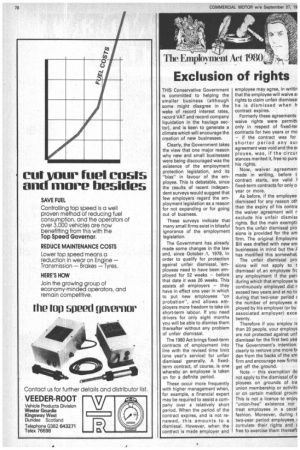Exclusion of rights
Page 80

If you've noticed an error in this article please click here to report it so we can fix it.
THIS Conservative Government is committed to helping the smaller business (although some might disagree in the wake of record interest rates, record VAT and record company liquidation in the haulage sector), and is keen to generate a climate which will encourage the creation of new businesses.
Clearly, the Government takes the view that one major reason why new and small businesses were being discouraged was the existence of the employment protection legislation, and its "bias" in favour of the employee. This is debatable, since the results of recent independent surveys would suggest that few employers regard the employment legislation as a reason for not expanding or for going out of business.
These surveys indicate that many small firms exist in blissful ignorance of the employment legislation.
The Government has already made some changes in the law and, since October 1, 1979, in order to qualify for protection against unfair dismissal, employees need to have been employed for 52 weeks — before that date it was 26 weeks. This assists all employers — they have in effect one year in which to put new employees "on probation", and allows employers more freedom to take on short-term labour. If you need drivers for only eight months you will be able to dismiss them thereafter without any problem of unfair dismissal.
The 1980 Act brings fixed-term contracts of employment into line with the revised time limit (one year's service) for unfair dismissal generally. A fixedterm contract, of course, is one whereby an employee is taken on for a definite period.
These occur more frequently with higher management when, for example, a financial expert may be required to assist a company over a relatively short period. When the period of the contract expires, and is not renewed, this amounts to a dismissal. However, when the contract is made employer and employee may agree, in writin that the employee will waive al rights to claim unfair dismissal he is dismissed when h contract expires.
Formerly these agreements waive rights were permitti only in respect of fixed-ter contracts for two years or mo — if the contract was for shorter period any su( agreement was void and the et ployee, was, if the circur stances merited it, free to ours' his rights.
Now, waiver agreemeni made in writing, before t contract starts, are valid f fixed-term contracts for only o year or more.
As before, if the employee dismissed for any reason oth than the expiry of his contra the waiver agreement will r exclude his unfair dismiss rights. But the main exemptil from the unfair dismissal pro sions is provided for the sm firm. The original EmploymE Bill was drafted with new sm businesses in mind but the ,t has modified this somewhat.
The unfair dismissal pro sions will not apply to t dismissal of an employee frc any employment if the peni. during which that employee w continuously employed did r exceed two years and at no tir during that two-year period c the number of employees ei played by his employer (or by associated employer) exce twenty.
Therefore if you employ 1E than 20 people, your employe are not protected against unf dismissal for the first two yea The Government's intention clearly to remove one more bi den from the backs of the sm firm and encourage new firms get off the ground.
Note — this exemption do not apply to the dismissal of ei ployees on grounds of tra union membership or activitii or on certain medical grouni This is not a licence to enjoy "union-free" existence nor treat employees in a caval fashion. Moreover, during t two-year period employees cumulate their rights and E free to exercise them thereaft




























































































































